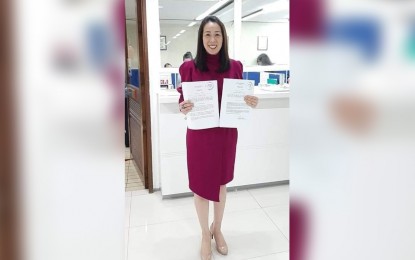
Biñan City Rep. Marlyn Alonte
MANILA – A lawmaker at the House of Representatives is pushing for a bill that seeks to unburden public school teachers of non-teaching responsibilities to solve quality issues besetting basic education.
In a statement on Friday, Biñan City Rep. Marlyn Alonte said House Bill 5562, or the "Bawas Non-Teaching Load Act", provides that appropriate and qualified administrative personnel shall be responsible for the performance and discharge of non-classroom teaching functions and roles on campus so that teachers can better focus on classroom teaching.
Alonte proposed it in the wake of the bottom-scraping results of Filipino students' rankings in a global assessment of 79 countries.
The results of Programme for International Student Assessment (PISA) 2018 showed that the Philippines scored 353 in mathematics, 357 in science, and 340 in reading, all below the average of participating Organisation for Economic Co-operation and Development countries.
"Time has come for the beginning of the end of the administrative work overload of teachers, so they can focus on teaching, professional advancement, and work-life balance," Alonte said.
The bill proposes new and different sets of basic complements of administrative personnel under the principal/headteacher/teacher-in-charge. Manpower complements are configured according to student population: small school – under 1,000; medium-sized school - 1,000 to 2,000; large schools - 2,001 to 2,999; and mega schools – 3,000 and higher.
Meanwhile, ACT-CIS Party-list Rep. Jocelyn Tulfo suggested tapping education bonds and foreign aid for funding of quality improvement programs.
As for the reading challenges of students, Tulfo said a special Alternative Learning System (ALS) intervention curriculum, run by the Department of Education’s (DepEd) Education for Learners with Special Needs Office, could be utilized to help Grade 3 pupils with significant reading comprehension difficulties.
"However long it takes for them to reach the reading standard of Grade 6 level, they stay in the ALS until they graduate," Tulfo said.
"For current students in Grades 4, 5 and 6 the same ALS curriculum for non-readers should be able to absorb those students and prevent the non-reading problem from spreading to high school,” she added.
Tulfo said DepEd must hire more teachers with special training on students with reading challenges to implementing this intervention.
“I believe there is no other way to go about this massive reading problem in our public elementary schools," Tulfo said. (PNA)
